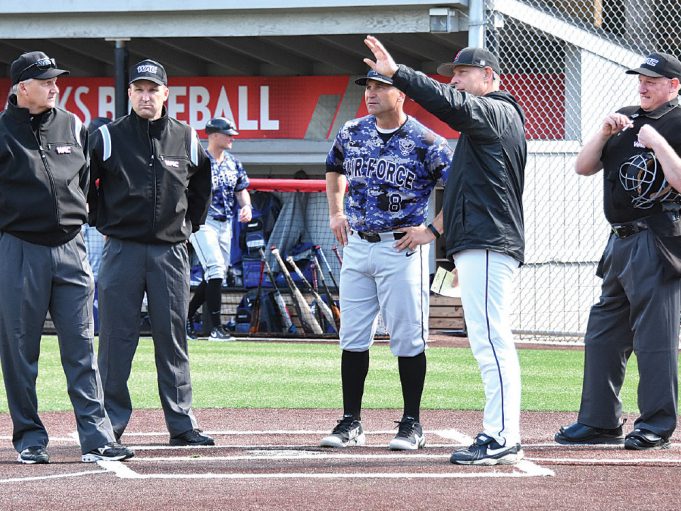At three different umpiring camps I have attended over the past two offseasons, I have heard one conference coordinator use the same phrase repeatedly: “You will need to work 100 three-umpire games before you feel proficient working the three-umpire system.”
From what I have experienced in my own umpiring career, it’s a wise statement. The problem is, it points to a very real chicken-or-the-egg scenario: How does one get the opportunity to work the levels of baseball that require three-umpire mechanics without having those 100 games of three-umpire mechanics already on the umpiring resume?
Let me offer the following blueprint as a way for umpires looking to learn the three-umpire system to, well, game the system and get the reps that can help expedite that 100-game education.
Attend Three-Umpire Camps
Every umpire can and should learn something from every umpiring camp. However, not all camps focus on the same systems and mechanics. If you are an umpire who wants to specifically learn the three-umpire system, attending a camp that is focused on the two-umpire system is not going to help with that specific goal.
Each offseason, there are several camps devoted to the three-umpire system throughout the country. Some of these camps lean more heavily toward education. Some lean more heavily toward evaluation and take a more advanced approach to three-umpire mechanics. Either way, a good three-umpire camp that runs between 3-4 days is going to provide not just a heavy dose of classroom instruction but multiple opportunities to get on the field and get a feel for the three-umpire system. Attend two of these in one offseason, and you’ll not only chalk up 8-10 games toward that 100-game experience goal, but you’ll also have the opportunity to build off the first camp in the second one. That “muscle memory” is what you are looking to achieve, so that working three-umpire mechanics one day becomes just as natural as two-umpire mechanics eventually did at some point in your career.
Take Advantage of Fall-Ball Assignments
Most colleges are looking for umpires to work their fall games in September and October, either on a paid or volunteer basis. Take advantage of these opportunities when they present themselves. These games offer the chance to work in front of college coaches and show you are ready to handle that level of baseball, but also offer a low-stress game environment in which to work on your craft. If the coach is willing to pay for three umpires, perfect — it’s another chance to work the three-umpire system. If the coach is only looking for two, offer to work a freebie so you and the other two umpires can still work three-umpire mechanics and get the experience.
Yes, the occasional freebie is OK. Generally, we frown on officials working on a volunteer basis, as we don’t want to send the message that officials should be de-valuing their work; we already have more than enough people who will do that for us. However, that typically means it is rarely a good idea for a full crew to show up and work a scrimmage or game for free. It’s different when there is a paid, two-umpire crew already scheduled, and you offer to step in and allow the crew to work three-person so that everyone can get that experience. Whether it’s a local youth game or high school game, or something more competitive, your goodwill gesture allows not only for that work experience but will also show your assigner or coordinator that you are willing to make some personal sacrifices to improve your game, which is never a bad look. And if you are working with two partners who have the same goals and professionalism as you, chances are they will either offer to split their game checks with you, or at the very least will buy your postgame dinner or refreshments.
Watch Film
One of the great benefits of increased technology in the world of sports is the availability to have vast amounts of game footage at our fingertips on our laptops, tablets and phones. Take advantage and search out games featuring three umpires and watch how they work. Notice what they do well and learn from their mistakes. Better yet, if there is footage available of your own three-umpire games, break it down and self-evaluate your performance, again taking note of what you did well and areas where improvement is needed.
Dig Deep into the Three-Umpire Mechanics Manual
Different umpires learn better in different ways. While experience is typically the greatest teacher, some feel they best supplement that education while watching video. Others learn better in a classroom environment. Some are auditory learners and choose to take advantage of lectures and podcasts. And finally, some learn best via the written word. No matter your preference, a key piece in your umpiring toolkit is the three-umpire mechanics manual. While not every situation an umpire may encounter is shown in the manual, there is a comprehensive breakdown of umpiring mechanics and responsibilities for every pre-pitch situation an umpire should work to commit to memory. Remember, you will never go wrong by doing things “by the book.” It’s not until you have an extremely solid foundation in these basic fundamentals that you should even consider deviating from them.
Find a Mentor or Study Group
Trying to learn any new skill on your own can be a daunting task. It’s always helpful to have someone else you can turn to for advice and ask questions — especially if that someone has been there, done that. One of the great things about umpires is they are almost universally willing to talk shop and help others. At some point, every umpire who is experienced in three-umpire mechanics was once a rookie trying to find his or her way. Tap into that learning process, whether it’s a one-on-one relationship with a mentor who can show you the ropes or getting together with a group of umpires to discuss plays, look at film or dig into the rulebook or mechanics manual.
What's Your Call? Leave a Comment:
Note: This article is archival in nature. Rules, interpretations, mechanics, philosophies and other information may or may not be correct for the current year.
This article is the copyright of ©Referee Enterprises, Inc., and may not be republished in whole or in part online, in print or in any capacity without expressed written permission from Referee. The article is made available for educational use by individuals.


















